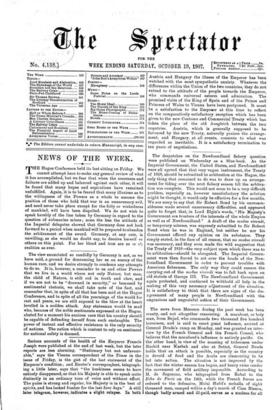The despatches on the Newfoundland fishery question were published on
Wednesday as a Blue-book. As the Imperial Government, the United States, and Newfoimdlarrd were all agreed that that very vague instrument, the Treaty of 1818, should be submitted to arbitration at the Hague, the only thing that remained to do was to draw up an arrange- ment for tiding over the next fishery season till the arbitra- tion was complete. This would not seem to be a very difficult problem, especially as, however unsatisfactory the solution might be thought, it would only be effective for a few months. We are sorry to say that Sir Robert Bond by his unreason- ableness made several unnecessary difficulties, and appeared quite to forget that, in Lord Elgin's words, "His Majesty's Government are trustees of the interests of the whole Empire as well as of Newfoundland." A draft of the modus vivendi, or temporary scheme, was expressly submitted to Sir Robert Bond when he was in England, but neither he nor his Government offered any opinion on its substance. They simply stated, in the face of all reason, that no modus vivendi was necessary, and they even made the wild suggestion that the Treaty of 1818—the very subject upon which there was to be arbitration—should be abrogated. The Imperial Govern- ment were then forced to act over the heads of the New- foundland Government in order to prevent troubles with American fishermen. The only way they could ensure the carrying out of the nzodus virendi was to fall back upon an old statute of George III. The Newfoundland Government again protested, and continued to withhold all help in the making of this very necessary adjustment of the situation. It is satisfactory to think that there are signs of the dis- agreement of many people in Newfoundland with the ungracious and ungrateful action of their Government.










































